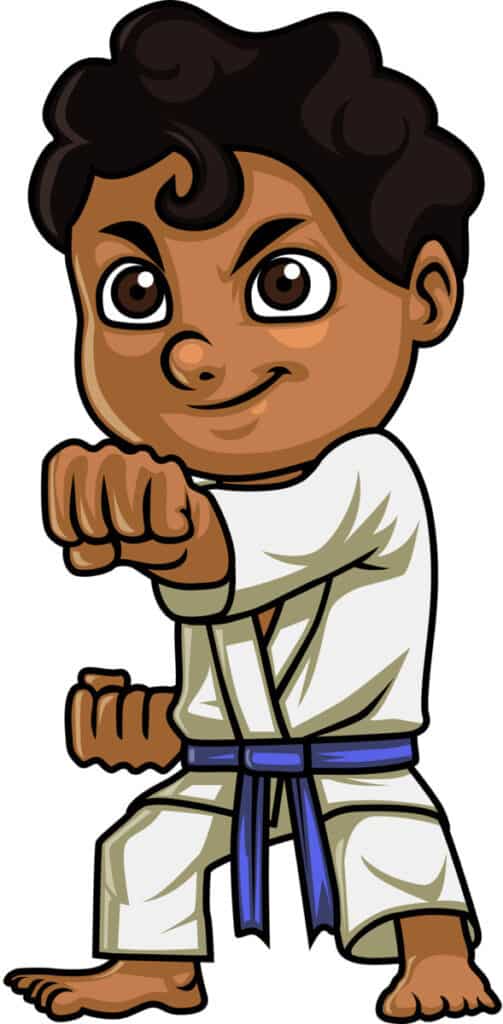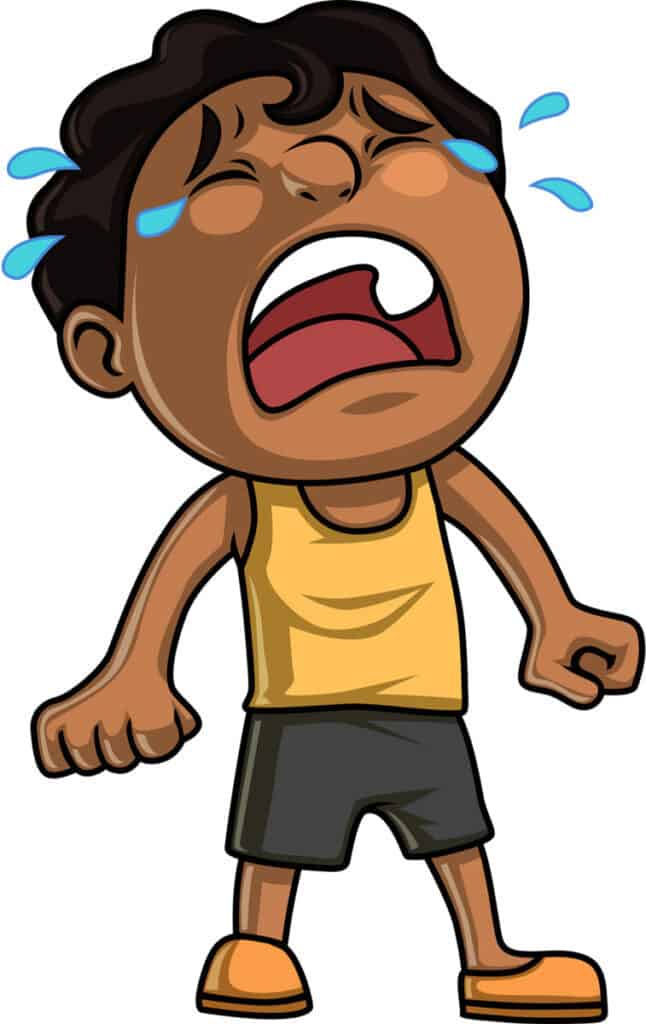Parents often enroll their kids in Karate and other martial arts classes for the physical fitness aspects of these sports. But it is becoming increasingly clear that a good martial arts dojo and sensei will also improve your child’s behavior across various areas of life.

Karate will help your child’s behavior by:
- Providing children with the ability to manage stress
- Helping them learn to self-regulate their impulses
- Helping decrease their aggressive behaviors
- Fostering concentration and good work habits
- Improving their confidence and self esteem
Karate can even be helpful to children with behavioral or social-emotional problems. It can also be used as a non-medical therapy to treat children with behavioral, emotional and social difficulties stemming from conditions like Attention Deficit Hyperactivity Disorder (ADHD).
Contents
- How Do Karate Teaching Methods Help Children?
- How Will Karate Help my Child’s Behavior?
- Karate Helps Children Manage Stress and Anxiety
- Karate Teaches Constructive Conflict Resolution
- Karate Leads to Decreased Aggression Born of Frustration
- The Physical Benefits of Karate Lead to Confidence and Improved Self Esteem
- Karate Leads to Social Bonds
- Karate Teaches Work Habits That Spill Over into School and Home Life
- Karate Helps Children Learn to Respect Their Teachers
- Karate Helps Establish Routine in a Child’s Life
- Karate Teaches Children to Compete in Healthy Competition
- Karate Instills Independence and Self-Reliance in Children
- Karate: More Than Just Exercise
How Do Karate Teaching Methods Help Children?
Karate is typically taught in a dojo – a controlled environment with few distractions, yet even online martial arts can provide the necessary structure to ensure cooperation and discipline. Check out Online Martial Arts here and find information about a free trial for your child.
A typical class begins with a bow to the sensei. After warm-up and conditioning exercises, students practice forms and particular skills like kicking and blocking.
Each action requires concentration. Each movement must be deliberate and precise. The class has a structured lesson followed by practices. Respecting teachers and peers is a baseline expectation. The class lasts for about an hour ending with another bow to the sensei.
Students test at certain benchmarks to acquire different colored belts beginning with a white belt and culminating at the black belt level. The belt system allows the students to progress in a skills-based hierarchy over years of practice.
How Will Karate Help my Child’s Behavior?
Karate is taught in a manner that encourages children’s mental and physical well-being. It equips the child with skills that can be employed beyond the confines of the dojo, and the net result is a positive impact on the way a child interacts with the world.
Karate Helps Children Manage Stress and Anxiety

Children typically deal with stress by becoming anxious or acting out. Physical exercise helps to relieve stress in a number of ways as written about by the Mayo Clinic. Karate provides children a physical outlet to relieve the tensions they feel, an energetic way to excise pent up emotion.
One way to help them relieve the stresses that build up in their undersized bodies is with a kicking bag designed for just their size. I have used many of these free-standing bags to train kids.
Here are two I would highly recommend that you can order directly from Amazon. One here for mom’s and kids to use. Or here is one even dads of all sizes can use as well.
The focus and discipline required in Karate to master the movements of the body is a type of meditation that allows children to clear their minds and forget their worries. In addition, the social aspect of a class allows them to build friendships and enjoy their practice.
This means they have access to the best stress buster of all: FUN!
The fun filled release of stress allows a child to find a good equilibrium from which to act, resulting in calmer behavior—especially in aggravating situations.
Karate Teaches Constructive Conflict Resolution
Regardless of how martial arts, including karate, are portrayed in the movies, the fact is that Karate and other martial arts do not encourage conflict and aggression. Instead, they emphasize being alert and avoiding hostile situations, and taking deliberate action rather than reacting to situations.
The manner in which Karate and other Japanese martial arts are taught, and the strategies and concepts they apply in practice, arm children with the ability to deal constructively with conflict rather than choosing to avoid or escalate it.
Children react in different ways when dealing with conflict. Students can carry the teachings of Karate with them into school and other contexts for the rest of their lives. They also have an added benefit of Karate: the understanding that if a physical conflict (e.g. a bully) must be faced, they have the tools to defend themselves.
Karate Leads to Decreased Aggression Born of Frustration
Discipline, self-control, respect and courtesy are pillars of the practice in Karate. Exercises in training for Karate require precise movements and proper form. As the child progresses to the higher levels, the demands of the sport become more challenging for the child, requiring strength, agility and coordination.
Some students are frustrated by challenges. Students with special needs may resort to aggression when frustrated. One way to diffuse the negative side effects of frustration is by using a heavy bag. Amazon has one at this link that works for moms and kids or one at this link that can even stand up to the punishment dads can deal.
In the socially inclusive space of a dojo, though, every student learns how to overcome challenges step by step as they learn Karate. The discipline and focus developed through the sport teaches students to rely less on aggression to overcome their frustrations.
The Physical Benefits of Karate Lead to Confidence and Improved Self Esteem
The physical benefits of martial arts – increased strength, agility, improved balance, etc. – can make children feel confident as they master various levels, and this can foster a positive sense of self. When martial arts training helps with obesity and insomnia, it can improve a child’s body image.
Karate’s emphasis on proper form and technique can also help children who have difficulty with skills like:
- Balance
- Dexterity and deftness
- Having confident motor control of their body
Karate Leads to Social Bonds
Because Karate is taught in groups and requires collaboration between students as they practice, Karate classes lead to new friendships. They also give children a sense of belonging.
For children with behavioral challenges, who find it hard to fit in at school or on the playground, this can mean that the dojo becomes a safe space where they feel accepted. This sense of belonging also allows them to navigate social situations in other spaces with grace.
For those with severe trouble dealing with others, sometimes a bit of distance can be a good thing. There are two options when dealing with school and extra curricular activities.
Mat has an article at this link covering his Online Karate Classes that any younger child can take right from your home. You can also read an article at this link I wrote that covers how teachers view homeschooling and how they get it wrong.
Karate Teaches Work Habits That Spill Over into School and Home Life
Karate involves regular testing and rising through the ranks of the belt system. It can take years for a child to acquire the skills to rise from the novice status of a white belt to the master status of a black belt. This teaches children about commitment, purpose and perseverance.
For example, weekly practices mean students develop good work habits. Regular testing allows them to set goals and work towards them step by step in a supportive environment. When challenges arise, children learn to resolve them through collaboration and practice with their sensei and other students.
This allow students to learn how to work well towards their goals individually and how to behave when they are working with others.
Karate Helps Children Learn to Respect Their Teachers
The traditions of bowing before your teacher is perhaps the greatest outward show of respect for a sensei, but most martial arts teachers also teach children to listen and speak respectfully to their peers and teachers.
Regarding that, it’s especially important to find a good dojo for that reason. You want to know that your child’s sensei is teaching them proper respect and listening skill. Make sure to watch for teachers who are either too severe or too lax in their dojo.
Karate Helps Establish Routine in a Child’s Life
Because learning Karate requires regular attendance, it becomes a well-established part of a child’s routine. The stability of a predictable routine helps children maintain a calm disposition since they know what is expected of them.
Karate Teaches Children to Compete in Healthy Competition
In addition to tests, there are karate competitions. In fact, 2020 would have been the first year that Karate would have been an Olympic sport.
Competing in karate competitions among students from your own dojo or other dojos allows your child to kindle the spirit of friendly competition.
Karate Instills Independence and Self-Reliance in Children
Most parents want to nurture their children’s independence. The focus on self-improvement and making progress in stages in Karate allows children to make independent progress towards goals. The karate dojo is one more place where children can practice being self-reliant and independent under the guidance and supervision of a professional adult teacher.
Karate: More Than Just Exercise
Most parents enroll their children in martial arts classes like Karate for the physical benefits offered by the sport. But Karate can positively impact your child’s behavior.
What aspects of behavior are impacted depends on what martial art your child is learning since different martial arts may emphasize different aspects. The philosophy of the teacher and the dojo you select for your child also matter.
Martial arts, especially styles like Karate, help your child’s behavior and affect it in several positive ways.
